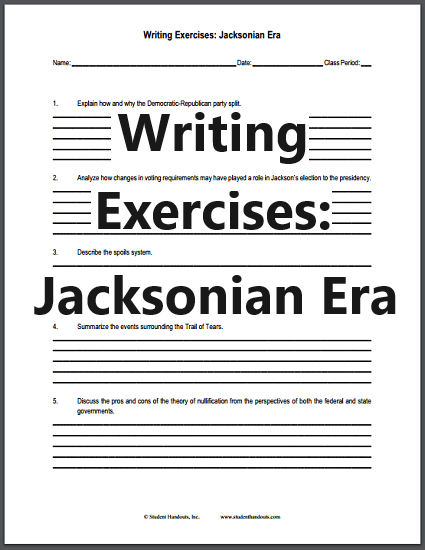| Jacksonian Era Essay Questions |
|---|
| www.studenthandouts.com ↣ U.S. History ↣ Westward Expansion ↣ Worksheets |
 |     |
|
1. Explain how and why the Democratic-Republican party split. The Democratic-Republican Party split in the 1820s due to factional disputes arising from the controversial "corrupt bargain" of the 1824 election. Supporters of Andrew Jackson evolved into the Democratic Party, emphasizing populism and states' rights. Opponents, including backers of John Quincy Adams and Henry Clay, formed the Whig Party, favoring a stronger federal role in promoting economic development through the American System. This realignment ended the Era of Good Feelings. 2. Analyze how changes in voting requirements may have played a role in Jackson's election to the presidency. Changes in voting requirements were crucial to Andrew Jackson's election. By the 1820s, many states eliminated property ownership requirements for white men, dramatically expanding the electorate. This new wave of voters, championing the "common man," felt disconnected from the political elite and strongly identified with Jackson's populist image. Their support provided the broad popular base necessary for his victories in 1828 and 1832. 3. Describe the spoils system. The spoils system, championed by Andrew Jackson, rewarded political supporters with public office appointments. It operated on the principle that to the victor belong the spoils of the election, arguing it promoted democratic rotation and loyalty. However, it often prioritized patronage over merit, leading to widespread inefficiency and corruption within the federal government until reforms like the Pendleton Civil Service Act of 1883 began to replace it. 4. Summarize the events surrounding the Trail of Tears. The Trail of Tears (1838-39) was the forced relocation of Cherokee and other Southeastern Native American nations following the Indian Removal Act of 1830. Defying a Supreme Court ruling, President Andrew Jackson enforced the removal. Approximately 100,000 indigenous people were driven from their ancestral lands, with thousands dying from disease, starvation, and exposure during the brutal march to designated "Indian Territory" west of the Mississippi River. 5. Discuss the pros and cons of the theory of nullification from the perspectives of both the federal and state governments. From a state perspective, nullification was a proslavery tool to protect "states' rights" against federal power, asserting sovereignty. For the federal government, it was a dangerous and unconstitutional threat to national union, undermining the Supreme Court's authority and the supremacy clause. While states saw it as a check on tyranny, the federal government viewed it as a recipe for disunion and anarchy, ultimately leading to crisis. Click here to print (PDF). Answers will vary. |
|
The theory of nullification is a contentious concept in American history that revolves around the idea that individual states have the right to declare federal laws unconstitutional and therefore unenforceable within their borders. This theory was notably championed by proponents of states' rights in the antebellum period, particularly during the Nullification Crisis of 1832-1833. Here are the pros and cons of nullification from the perspectives of both the federal and state governments.
From the Perspective of State Governments (Pros):
While states have mechanisms to challenge federal laws through the courts, nullification as a unilateral state action remains a highly controversial and legally questionable concept. The debate over nullification underscores the ongoing tension between states' rights and federal authority in the United States. |
| www.studenthandouts.com ↣ U.S. History ↣ Westward Expansion ↣ Worksheets |














































